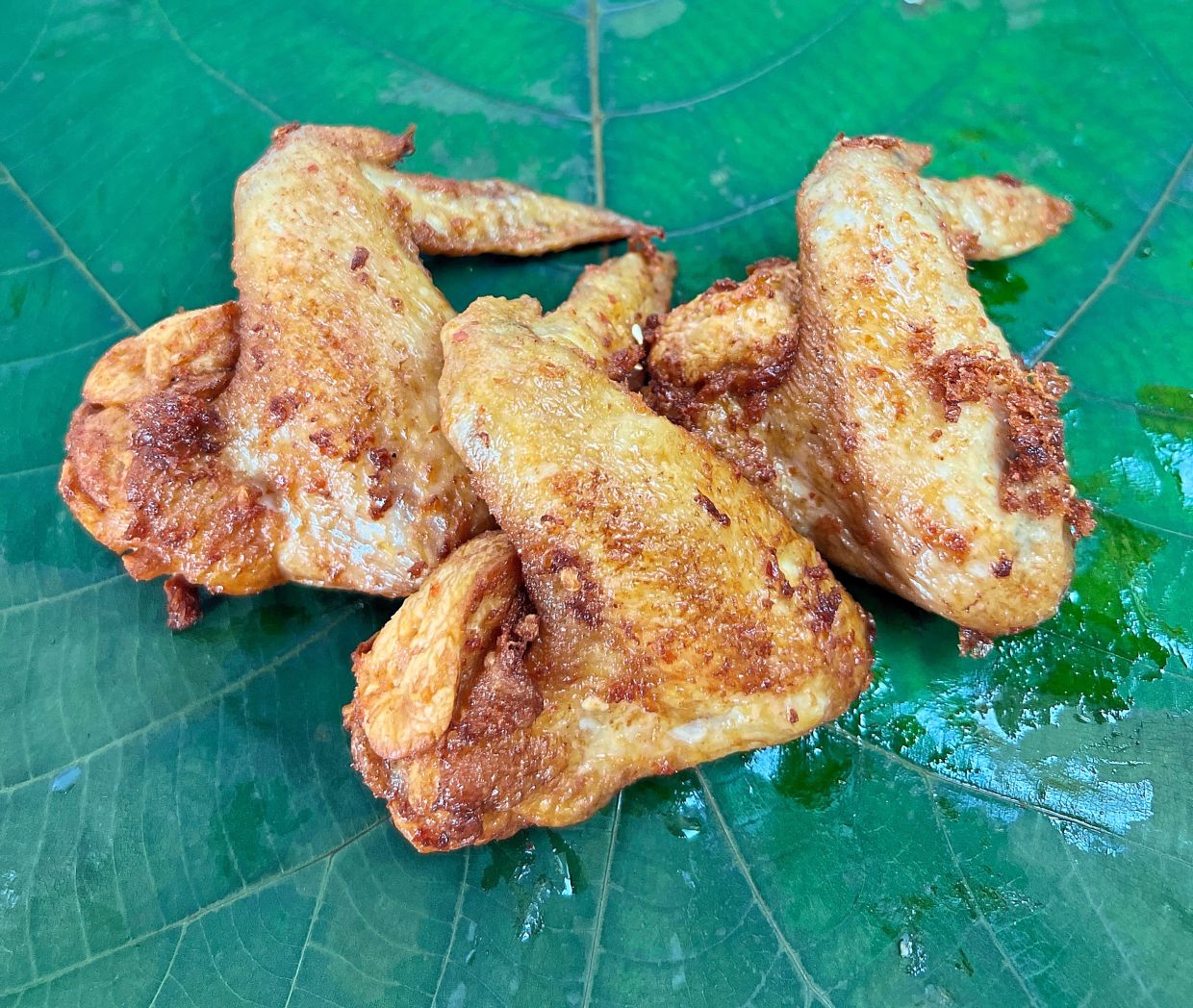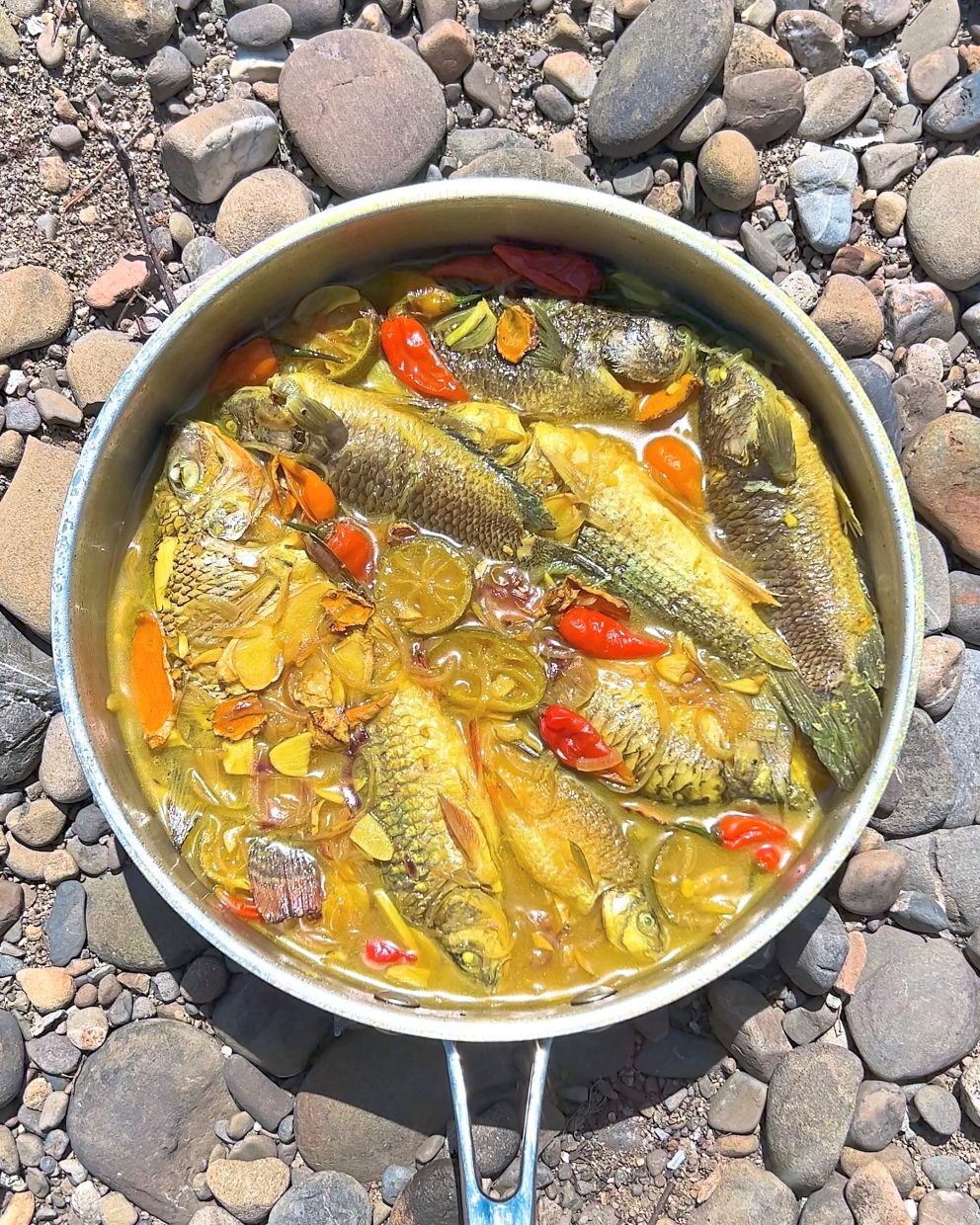Pison holding a jar of ‘bosou ikan’, a local preserved dish in Sabah.
“KANOU mogonsok” (Let’s cook, in Kadazandusun).
Watch a Ropuhan Di Tanak Wagu video and you will hear the man behind the channel, Pison Jaujip, saying this just before he starts cooking.
The lad from Kota Belud has become popular for bringing Sabahan traditional cuisine and produce to the forefront among netizens, demonstrating the simple ways of cooking them at home.
It started in 2016 when Pison, who works in the family business in agriculture, noticed the trend of the younger generation being inclined to food that is trending, like those portrayed in K-drama (Korean shows) as well as fast food.
Most of the young folks he knew who lived in urban areas did not know how to cook traditional dishes or barely eat them, as they were not exposed to them in today’s world.
Thus, the Bachelor of Business Administration graduate took it upon himself to change this and set up channels in social media platforms as a content creator to promote such dishes.
Ropuhan Di Tanak Wagu (RDTW) was created in June that year, which loosely translates to Bachelor’s Kitchen in the Dusun Tindal lad’s language.
“I wanted more youngsters to know our local dishes, especially food from my ethnic group like bosou (preserved food, usually fish), jeruk tuhau (wild ginger native to Sabah) and jeruk bambangan (local fruit described as wild mango).
“I also realised how ‘superfoods’ like blueberry and kale were gaining popularity, but we too have forests with endemic plants and fruits that have health benefits.
“But since only the older generation and the elders are aware of this, they did not become viral and thus, there is no demand for such ingredients,” he said.
Today, visit any of his social media platforms and you can learn how to prepare losun tumis lada putih (wild spring onion cooked with Sabah white chillies), or pinarasakan/pinaasakan – a way of cooking fish by braising – among other traditional Sabahan cuisine.
At present, the 40-year-old has about 134,000 followers in Facebook, 22,100 followers in Instagram and 15,400 followers in YouTube. The newer TikTok account successfully garnered 50,600 followers.
Pison derived his cooking experience from family and his own research in making the videos.
He said his parents, who used to work at padi fields and now run a rice mill, used to train him and four younger siblings when they were small to cook for themselves when they go to work.
“The first thing my father thought me was cooking ikan cara tarajun (a random way of cooking with basic ingredients in your pantry), when we have nothing in the fridge and he asked me to catch a fish from the lake.
“He asked me to wash the fish without cleaning its guts because we were children and not good in handling knives yet.
“My father told me to fill the wok with water and put some salt in before dropping the fish in, covering the wok and waiting for it to cook. He told us not to eat the skin and gut, just the flesh,” Pison reminisced.
He said he also grew up with his grandmother in his early years before he started going to school and learned to eat traditional food from her, even joining her to find vegetables in the forest, catching fish in the river, and accompanying her to the orchard.
He gained more knowledge by reading books and meeting up with old folks and sellers at tamu (weekly market) or cultural exhibitions, as well as followers who shared their own ideas and food experiences.
“I have always loved cooking and experimenting with recipes,” Pison added.
With that mindset, he wanted to keep local produce relevant to attract the tastebuds of youngsters, hence he likes to use local ingredients but with a twist to modernise the recipes.
“For example in Thailand, while they maintained their traditional recipes, they also ‘upgraded’ their food with modern fusion, and one can still taste and know the food is from that country.
“I try to do this in my videos so some followers may have ideas to cook and make them marketable, like tuhau jam or sambal bambangan,” he added.
Due to demand from followers who wanted to try his cooking, Pison came out with his own food products like marinades or paste, jams and juices which are available online or when he hosts a booth during exhibitions.
While RDTW’s strongpoint is Pison speaking in Sabahan dialect, the forward-thinking content creator is considering using English to make his videos shareable with the rest of the world.
“When I first started, I used English and Malay subtitles but changed it to voice-over due to my videos being re-uploaded without my knowledge or consent, and this has actually helped with engagement with my followers.
“But I hope my channels inspire more Ropuhan Di Tanak Wagu or Ropuhan Di Kesumandakan (for girls) ... meaning more youngsters will be involved in preserving and expanding the legacies of our ancestral cooking. Another aspiration is to promote my channels outside Malaysia and one of the ways is collaborating with media or individuals to share Sabahan traditional cuisines.
“For example, I have assisted in talking about Bajau traditional food through (Singapore media) CNA Insider channel for their documentary Slumfood Millionaire (2020), and shared details about traditional food with Bryan Koh for his book Tamu: A Guest at the Bornean Table,” he said.
Pison’s aspirations go beyond making social media content – one day he hopes to have his own factory to make his food products as well as set up a restaurant under the RDTW brand.
“I also hope that one day I succeed in coming up with a recipe book, RDTW style, so that I leave behind a legacy for the future generation about the beauty and uniqueness of Sabahan traditional food,” he concluded.








